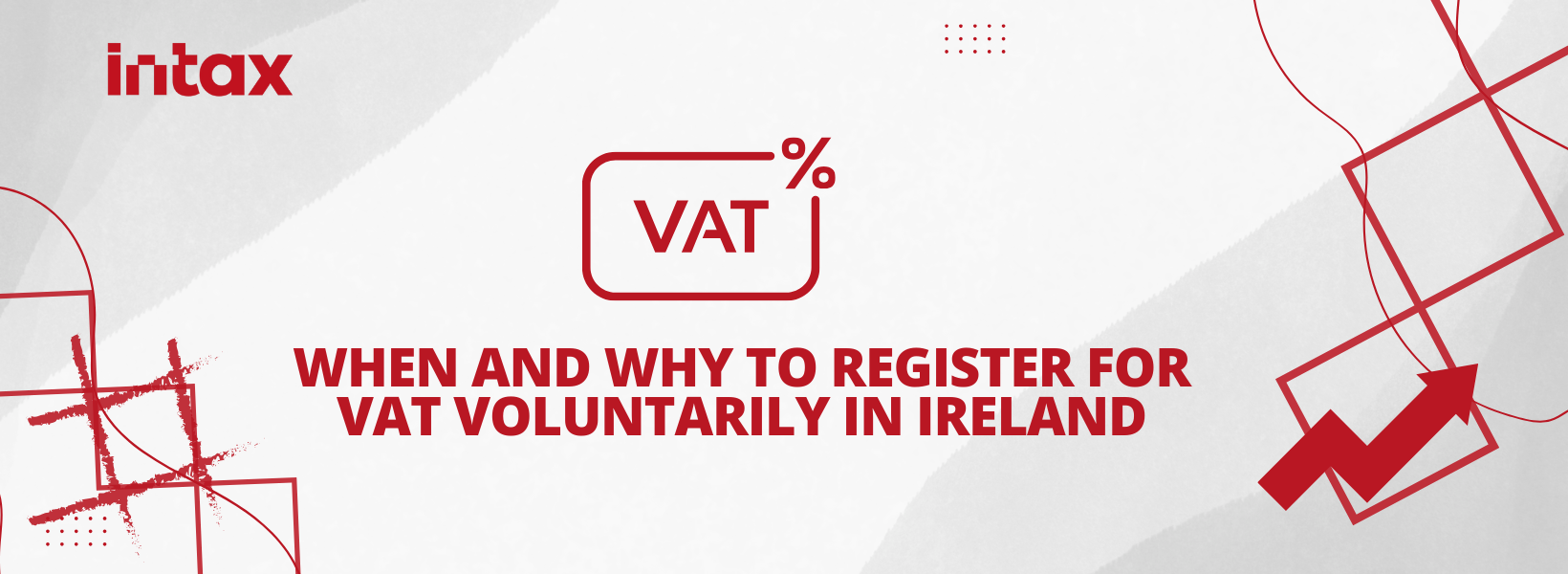Introduction
VAT (Value-Added Tax) is a term most Irish business owners will encounter sooner or later. While VAT registration becomes mandatory once your turnover exceeds a specific threshold, you don’t always have to wait.
In fact, voluntarily registering for VAT before hitting that limit can be a smart move — one that improves cash flow, enhances your business credibility, and aligns you better with clients who are already VAT-registered.
In this guide, we’ll help you understand:
- When VAT registration is required
- Why you might consider registering voluntarily
- What to consider before doing so
- How to apply
- And whether it’s the right step for your business
VAT in Ireland: A Quick Recap
VAT is a consumption tax applied to most goods and services in Ireland. Businesses collect VAT from their customers and remit it to Revenue, while also reclaiming VAT paid on their own business-related purchases (called input VAT).
VAT Registration Thresholds (2025):
- €37,500 for services
- €75,000 for goods
If your turnover exceeds these limits, VAT registration is mandatory. But if you’re below these thresholds, you can register voluntarily — and that’s where the opportunity lies.
Pro Tip: You can still reclaim VAT on pre-trading expenses once you register, provided they relate to your taxable activities. This is especially valuable for startups.
Why Consider Voluntary VAT Registration?
Here are the main reasons Irish businesses register for VAT voluntarily — even when they don’t have to:
1. Reclaiming VAT on Business Purchases
If your business has high setup or ongoing costs — for example, on office rent, software, equipment, or accounting services — you may be paying significant VAT on these expenses. Once registered, you can reclaim that VAT, reducing your overall costs.
🔗 Related Read: What Expenses Can Irish Landlords Claim Against Rental Income
(Also applies to small businesses when tracking expenses for VAT deductions)
2. Improving Business Credibility
Being VAT-registered signals to clients and suppliers that your business is established and serious. It can make you look more professional, especially if you’re pitching to corporates, larger companies, or government agencies.
Clients often expect VAT-registered suppliers — especially in B2B relationships — and may feel more comfortable engaging businesses that are already in the VAT system.
3. Better Alignment with VAT-Registered Clients
If your clients are already VAT-registered, charging VAT doesn’t affect them — they can reclaim it. This means:
- You can reclaim input VAT
- They don’t mind paying it
- Everyone benefits
Pro Tip: If you’re supplying mostly to individuals or non-VAT-registered clients, adding VAT could make your pricing less competitive. Always consider your customer profile before registering voluntarily.
4. Preparing for Future Growth
If your business is growing steadily and you expect to exceed the threshold in the coming months, registering in advance makes the transition smoother.
Why wait and risk missing a mandatory deadline or being forced to adjust your invoices mid-year?
🔗 Related Read: Start the Year Right: Essential Tax Resolutions for Irish Businesses in 2025
(Includes setting up strong VAT and compliance systems early in the year.)
Things to Consider Before Registering Voluntarily
Voluntary VAT registration can offer benefits, but it also adds complexity. Before taking the step, consider:
1. Administrative Commitment
- You’ll need to file VAT returns (typically every 2 months)
- Maintain VAT-compliant invoicing
- Keep records of VAT charged and reclaimed
Pro Tip: Using a cloud-based accounting system or working with a VAT advisor like Intax.ie can automate much of this.
2. Cash Flow Implications
You must collect VAT from your clients and remit it — which can affect cash flow if clients delay payments or if you work with non-VAT-registered individuals (like private consumers).
3. Pricing Strategy Impact
If your customers are mainly individuals or small startups (who can’t reclaim VAT), your prices may appear more expensive post-VAT.
This is particularly relevant for:
- Freelancers working with consumers
- Service providers in competitive pricing markets
🔗 Related Read: Tax Tips for Freelancers and Contractors: Staying Ahead in 2025
(Considers how VAT may or may not benefit your client base)
How to Register for VAT Voluntarily
If you’ve assessed your situation and are ready to register, here’s how:
What You Need:
- A valid Tax Reference Number
- A business bank account
- Proof of trade or intent to trade
- Completion of the TR1 form (for sole traders) or TR2 form (for companies)
Registration is done via Revenue Online Service (ROS).
Pro Tip: Intax.ie can help you complete and file your registration application correctly — especially important when registering voluntarily, as Revenue may request further documentation.
Conclusion
Voluntarily registering for VAT isn’t for everyone — but for businesses that plan to grow, work with other VAT-registered entities, or incur regular VATable costs, it can offer real financial advantages.
Like most tax decisions, the key is planning with foresight — not reacting under pressure.
Need help deciding if VAT registration is right for your business?
Talk to the experts at Intax.ie — we’ll help you assess the pros and cons for your specific case, and guide you through a smooth, compliant registration process.





